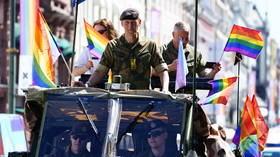Duolingo bends to Russia’s LGBT demand
The company behind the language-learning app has agreed to remove “LGBT propaganda” content from it, a Russian media watchdog says
The US-based company behind the popular language-learning application Duolingo has agreed to remove content potentially violating Russian “LGBT propaganda” laws, the country’s media watchdog, Roskomnadzor, has announced.
The watchdog said on Tuesday it had received a letter from the company on the matter, confirming its compliance with the nation’s legislation.
“The Duolingo company sent a response letter to Roskomnadzor, in which it confirmed that it had removed materials promoting non-traditional sexual relationships from its educational application,” the watchdog told TASS in a statement.
Roskomnadzor handed Duolingo a notice in April about its potential violation of Russian legislation and warning it “about a ban on publication of any materials promoting non-traditional sexual relations.” Failure to comply with such demands results in hefty fines for companies operating in Russia, and further non-compliance could potentially lead to their online services being blocked by the watchdog.
Russian authorities were notified of supposedly inappropriate materials disseminated by the app early this year by a local human rights group. The activists raised their concerns over the app, stating that school students have repeatedly run into tasks provided by the app that involved descriptions of gay relations.
Thus far, the US-based company has not made any statement on the affair, while its social media feeds are packed with celebratory messages to mark Pride Month. The free language-learning platform Duolingo was launched back in 2011, over the years becoming the world’s most popular app of its type.
Russia has increasingly tightened its legislation on “LGBT propaganda” since the early 2010s, first banning its dissemination among minors and ultimately expanding the prohibition to adults in 2022. The stance got even tougher last November, when the Russian Supreme Court designated the “international LGBT public movement” as an “extremist” group.
The ban stemmed from a lawsuit filed by the Russian Justice Ministry, which asked the top court to impose it, arguing that the movement had been involved in “incitements of social and religious discord” as well as showing unspecified “extremist traits.”
You can share this story on social media:








Comments are closed.